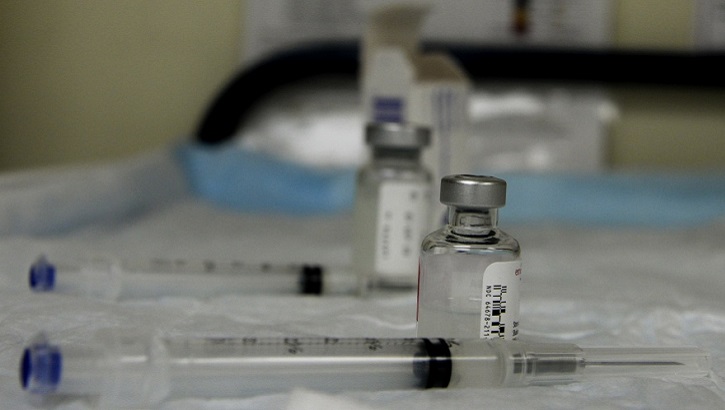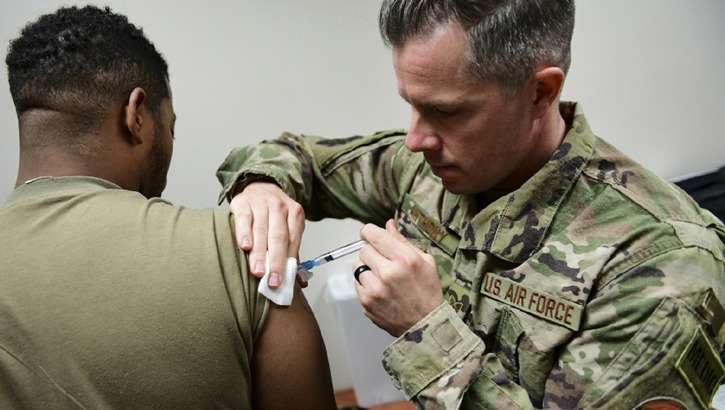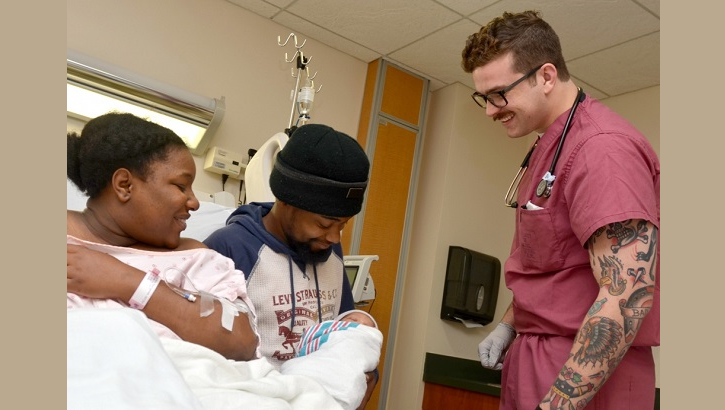
DoD, HHS implement Executive Order to modernize flu vaccines

Health care experts recommend that everyone 6 months and older – including the elderly, chronically ill people, and expectant mothers – receive the flu vaccine as soon as it becomes available. (DoD photo)
The Department of Defense and Department of Health and Human Services are implementing an Executive Order signed by President Donald Trump, aimed at increasing the manufacturing efficiency and effectiveness of flu vaccines.
The EO establishes the National Influenza Vaccine Task Force, which will include representatives from the Centers for Disease Control and Prevention as well as the departments of Justice, Agriculture, Veterans Affairs, Homeland Security, and Food and Drug Administration.
The task force is co-chaired by DoD and HHS.
Modernizing flu vaccines in the United States is a matter of national security and public health, said Dr. Terry M. Rauch, acting deputy assistant secretary of Defense for Health Readiness Policy and Oversight. Rauch added that DoD is committed to collaborating with HHS and partner agencies.
“DoD acknowledges and supports the great need for flu vaccines to be rapidly responsive, flexible, scalable, and more effective at preventing the spread of flu viruses,” Rauch said.
The goal of the EO is to encourage federal departments and agencies and their stakeholders to implement and support modernizing U.S. flu vaccines. That means reducing reliance on egg-based flu vaccine production; expanding domestic capacity of alternative methods to allow more agile and rapid response to emerging flu viruses; and advancing development of new, broadly protective vaccines with longer lasting immunity.
The EO directs tasks for key organizations. The DoD's responsibilities include estimating the costs of transition to scalable, innovative technologies from domestic, manufacturers; coordinating with other agencies to conduct epidemiological studies of vaccine effectiveness; identifying opportunities to use DoD's vaccine research and development enterprise; and investigating innovative pathways to facilitate the development of next-generation flu vaccines.
Rauch said the efforts related to the EO "support the National Defense Strategy’s priority to advance readiness of the force, providing the best possible support to our warfighters on the battlefield and back home. The U.S. Congress, as well as the public, should remain confident that federal departments and agencies are working together to effectively address influenza as a threat."
The flu virus is common; approximately 49 million Americans were affected during the 2017-18 season, according to the CDC. Flu infections usually happen during the fall and winter, according to the CDC, with peak activity occurring between December and February. Most flu sufferers will experience effects for a few days to up to two weeks.
Some people, however, develop complications that can become life-threatening. The CDC estimates that for the 2017-18 flu season, 959,000 hospitalizations and 79,000 deaths were linked to influenza.
"Certain groups are at high risk of flu-related complications," said Dr. Jay Montgomery, medical director of the Defense Health Agency's North Atlantic Region Vaccine Safety Hub, Immunization Healthcare Division.
At-risk individuals include children ages 6 months to almost 5 years, adults 50 and older, people with chronic medical conditions, and pregnant women, Montgomery said, citing statistics from the CDC.
Health care experts recommend that everyone 6 months and older – including the elderly, chronically ill people, and expectant mothers -- receive the flu vaccine as soon as it becomes available. It's particularly important not only for individuals in the at-risk groups, but also for people who live with or care for them. The benefits of the vaccine far outweigh the risks of contracting the virus, health care experts say.
"Influenza is a specific threat to U.S. forces," Rauch said.
Active-duty, National Guard, and Reserve members are required to get the vaccine annually, Montgomery notes. Flu vaccination is also a requirement for DoD civilian health care personnel, said Tara Reavey, chief of policy and program management for DHA's Immunization Healthcare Division.
Measles Myths: The Measles Can Be Life-Threatening
Video
9/30/2019

Measles can be life-threatening, especially for children and among people who have a compromised immune system.
Autumn ushers in season of falling under the weather with flu
Article
9/26/2019

Health care experts: Everyone 6 months and older should get vaccine
Measles Myths: Hand Washing Alone Won't Prevent Measles
Video
9/23/2019

Hand washing alone will not prevent the spread of measles. Dr. Margaret Ryan, preventive medicine physician, debunks some myths about vaccinations.
Measles Myths: Vaccines Are Safe
Video
9/17/2019

Vaccine components have been rigorously tested for safety. Dr. Margaret Ryan, preventive medicine physician, debunks some myths about vaccinations.
Measles Myths: Vaccines Do Not Cause Autism
Video
9/12/2019

Vaccines that prevent measles do not cause autism. Dr. Margaret Ryan, preventive medicine physician, debunks some myths about vaccinations.
Prevent to Protect: Analia
Video
8/30/2019

Cancer left 5-year-old Analia Pages unable to get vaccinated. Her father, Master Sgt. Edward Pages, has to take extra steps to protect her from diseases she’s susceptible to.
Prevent to Protect: Rosarios
Video
8/30/2019

10-year-old Tatiana Rosario has a weakened immune system as a result of her cancer treatment. Growing up, she and her family made sacrifices to keep her safe from disease.
Prevent to Protect: Immunization Awareness
Video
8/30/2019

Getting vaccinated not only protects yourself and your family from deadly diseases, but it also saves the lives to those who don’t have the immune system to fend for themselves. The Military Health System shares the stories of families with children who are at risk when others aren’t immunized.
Prevent to Protect: Barbara and Floriann
Video
8/30/2019

Barbara’s son Floriann grew up with an immune dysregulation. A Uniformed Services University pathology professor, she’s experienced first hand the importance of vaccines.
DHA IPM 19-006: 2019–2020 Seasonal Influenza Vaccination Program (IVP)
Policy
This Defense Health Agency-Interim Procedures Memorandum (DHA-IPM), based on the authority of References (a) and (b), and in accordance with the guidance of References (c) through (o), implementing instructions, assigns responsibilities, and prescribes procedures for the seasonal influenza vaccination program. • This DHA-IPM cancels and reissues DHA-IPM 18-005. • This DHA-IPM is effective immediately and will expire 12 months from the date of issue.
- Identification #: 19-006
- Date: 8/29/2019
- Type: DHA Interim Procedures Memorandum
- Topics: Immunization Healthcare | Immunizations | Preventive Health
Vaccines: A public health success story
Article
8/7/2019

Maintaining a medically ready force is just one of many reasons to vaccinate
CDC Yellow Book
Publication
7/19/2019
CDC Health Information for International Travel 2020
General Best Practice Guidelines for Immunization
Publication
7/9/2019
The Centers for Disease Control and Prevention (CDC) recommends routine vaccination to prevent 17 vaccine-preventable diseases that occur in infants, children, adolescents, or adults. This report provides information for clinicians and other health care providers about concerns that commonly arise when vaccinating persons of various ages.
Checklist: Best Practices for Vaccination Clinics Held at Satellite, Temporary, or Off-Site Locations
Publication
6/21/2019
A step-by-step guide to help clinic supervisors follow Centers for Disease Control and Prevention (CDC) and Department of Defense (DoD) guidelines while overseeing any nontraditional vaccination clinic setting.
Hospital honored for Hepatitis B vaccine birth dose rate
Article
6/10/2019

NH Jacksonville is the newest entry into IAC’s Birth Dose Honor Roll































No hay comentarios:
Publicar un comentario